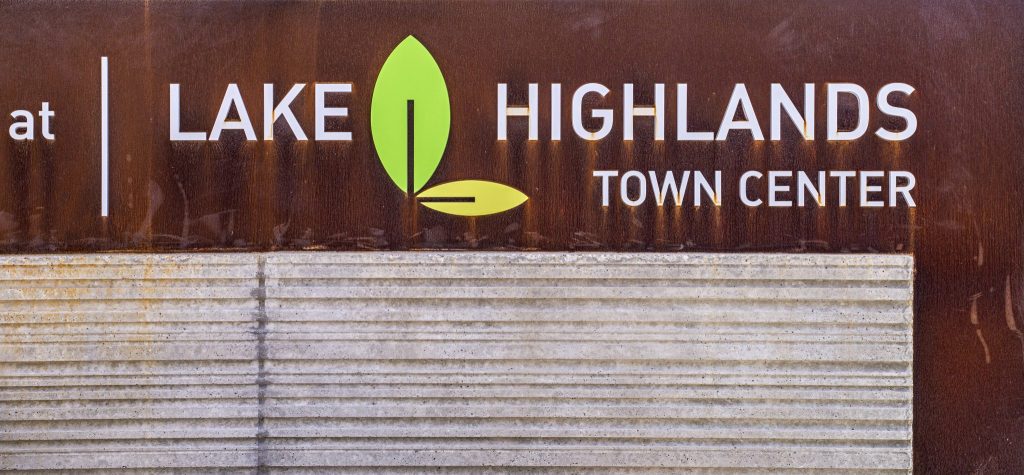Without any votes cast, Terri Hoover was declared the mayor of Lake Highlands Town Center.
“I became mayor by definition because nobody else was here,” she says.
Before neighbors bought groceries at Sprouts or flocked to Fish City Grill for lunch, Artistik Edge Hair Studio, which Hoover launched 29 years ago, was the first business to take a chance on the emergent development.
The hair salon’s previous location at Abrams and Royal didn’t provide adequate space. Two-thirds of Hoover’s clientele are Lake Highlands residents, so she was adamant about remaining a neighborhood business.
Lake Highlands Town Center offered ample space and parking, even though the majority of the development had yet to be constructed. The hair salon opened at the Haven apartments’ first floor in 2015, when many residents wondered if the 70-acre prairie would ever transform into a shopping center.
“We went from seeing parking lots and cars and cars and cars to nothing,” Hoover says.
Now The Lookout at Lake Highlands, high-end apartments that cost between $1,125-$2,560 per month, are available for rent. Besides the string of eateries like Taco Diner and Yogurtland, Starbucks is under construction. Negotiations for a bank are underway. The property north of Walnut Hill Lane will most likely become a residential development.
More than a decade has passed since former City Councilman Bill Blaydes envisioned the Lake Highlands Town Center to be our neighborhood’s pseudo downtown. The development has drastically changed since its inception, and its sustainability is up to neighbors who frequent the center.
“I think, given the circumstances, it’s turned into a very good project,” City Plan Commissioner Tipton Housewright says.
In 2006, Blaydes led a crusade to raze the high-crime apartments on Skillman between Abrams Road and Walnut Hill Lane in favor of a mixed-use development stacked with retail, restaurants and high-end apartments.
“Because of what we celebrate today, Lake Highlands will not become stagnant for our children,” he said during a 2008 groundbreaking ceremony.
Ironically, the project soon turned stagnant. The recession, followed by an ownership change, instigated an 8-year standstill. The property was purchased as a joint venture between Prescott Realty Group and Cypress Real Estate Advisors. Prescott provided the expertise, and Cypress covered the expenses. In early 2014, Prescott and Cypress underwent an “amicable divorce,” says Cypress managing director Bill Rafkin, who took over the project that year.
The development firm reimagined the town center as a village green, with pocket parks, family-friendly restaurants and services such as dry cleaners and hair salons.
“What was originally conceived was very grand, more aspirational than what was commercially feasible,” Rafkin says.
Many city planners advocated for the original plan, which they considered to be more urban.
“What was imagined was a larger, more dense project,” Housewright says. “The debate and the conflict for the last number of years was how do we dial back the density, the size and scope of the project, and still have something that resembles the town center.”
City Councilman Adam McGough, then recently elected, created a 20-person task force to discuss the town center’s fate. Then Cypress terminated a Tax Increment Financing (TIF) district, established in 2005 to help finance the project.
Cypress lost taxpayer funding for the project, but it also no longer was subject to strict city requirements, which also included mandatory affordable housing.
With fewer stakeholders around the table, “it really allowed for a fresh start,” McGough says.
“It was an interesting journey to get it to point that it was all approved and ready to go,” Blaydes told us recently. “The development is 85 percent of what we intended. I was looking for some residential over the top of retail done on Wildcat Way, so you had a real mix of residential and commercial.”
The tenants who occupy the town center were selected, in part, from the results of an online survey, Rafkin says. Residents prioritized an educational children’s center, yoga and pilates studios, toy store, massage parlor and dry cleaners. Most of those businesses have come to fruition.
“I’d love to have a yoga studio,” Rafkin says. “Other than that, I think we’ve met all the demand.”
Housewright still hopes that the density increases in the future, and that parking lots will be replaced with more development and maybe even a parking garage, similar to Henderson Avenue or portions of McKinney Avenue.
“I still would like this to be downtown Lake Highlands,” Housewright says. “I think it has the opportunity to mature into that over time.”






